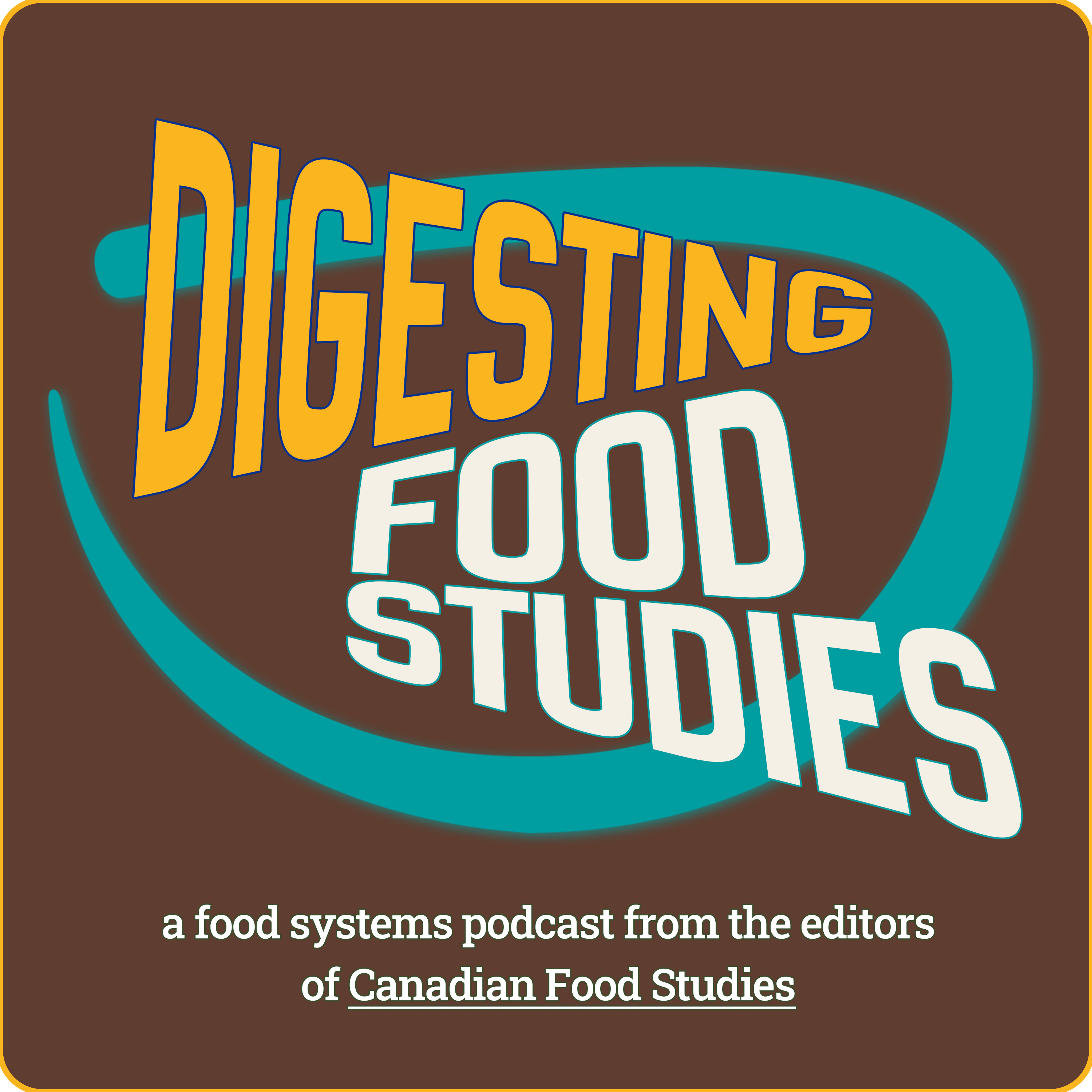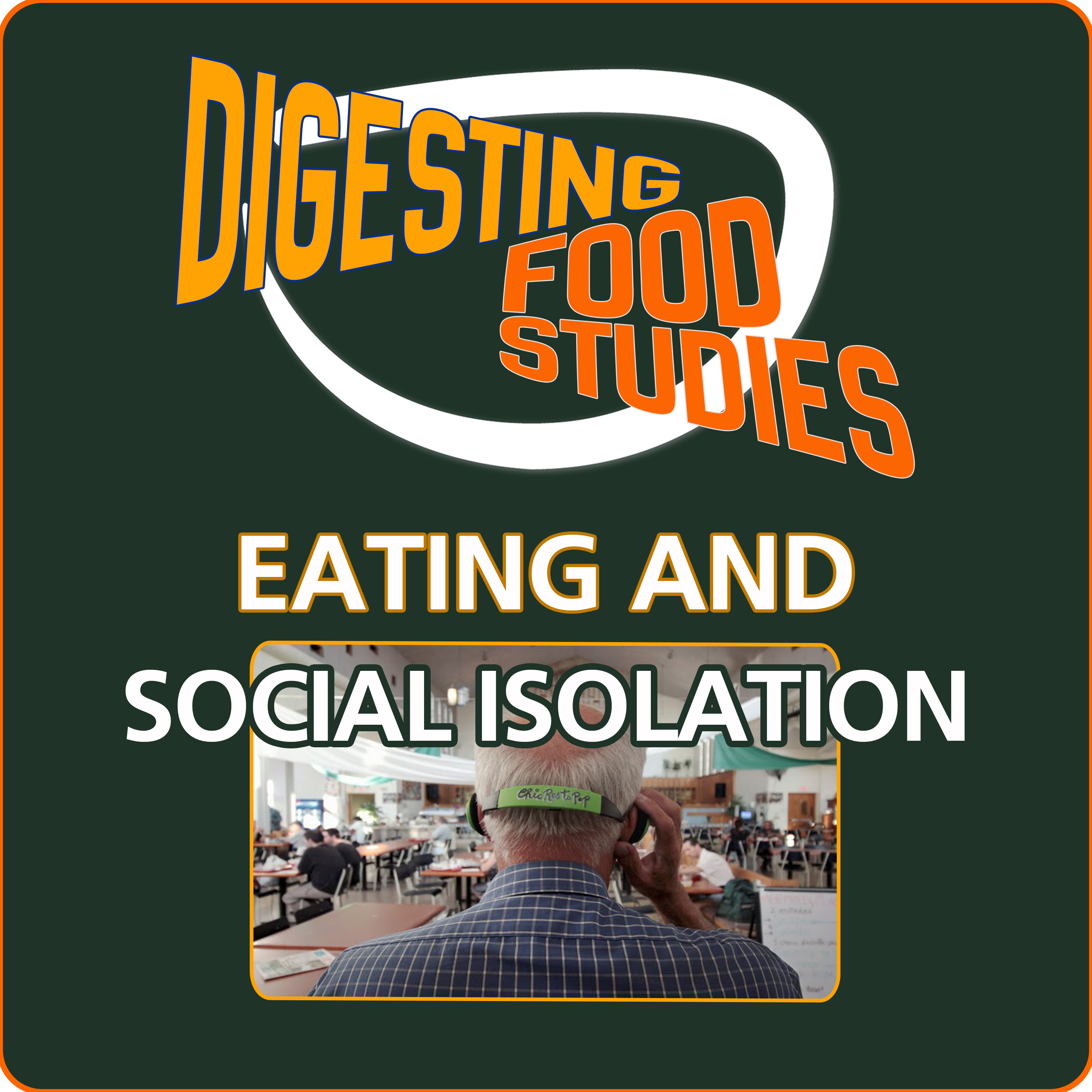Digesting Food Studies

Digesting Food Studies
Podcast Description
Digesting Food Studies is a podcast that helps break down research on food systems into manageable portions. It’s for listeners who are learning and teaching about food studies, for those working in fields and factories, and also for people in policy and politics, making the rules that govern and guide us. From food justice to sustainability to intercultural identity, from the technologies of agriculture to the relationships embedded in Indigenous foodways, each episode helps digest one big idea. As a tool for teaching, a guide for new researchers, or inspiration for practitioners and activists, Digesting Food Studies bridges the gap between academese and everyday eating.This podcast is supported in part by the Canadian Association for Food Studies and the Social Sciences and Humanities Research Council of Canada.Concentré d’études sur l’alimentation est un podcast qui vous aide à absorber la recherche sur les systèmes alimentaires une bouchée à la fois. Il s'adresse aux personnes qui apprennent et enseignent les études sur l'alimentation, à celles qui travaillent dans les champs et les usines, ainsi qu'aux personnes qui travaillent dans le domaine de la politique. De la justice alimentaire à la durabilité en passant par l'identité interculturelle, les technologies agricoles et la relationalité inhérente dans la connaissance autochtone, chaque épisode vous aidera à intégrer une grande idée. Outil d'enseignement, guide pour les nouveaux chercheurs ou source d'inspiration pour les praticiens et les activistes, Concentré d’études sur l’alimentation comble l’écart entre le monde universitaire et l’acte de manger.Ce podcast est soutenu en partie par l'Association canadienne des études sur l'alimentation et le Conseil de recherches en sciences humaines du Canada.
Podcast Insights
Content Themes
The podcast covers themes such as food justice, sustainability, intercultural identity, and Indigenous foodways, with episodes like analyzing urban farming policies and exploring traditional farming practices that address contemporary food security challenges.

Digesting Food Studies is a podcast that helps break down research on food systems into manageable portions. It’s for listeners who are learning and teaching about food studies, for those working in fields and factories, and for people in policy and politics, making the rules that govern and guide us. From food justice to sustainability to intercultural identity, from the technologies of agriculture to the relationships embedded in Indigenous foodways, each episode helps digest one big idea. As a tool for teaching, a guide for new researchers, or inspiration for practitioners and activists, Digesting Food Studies bridges the gap between academese and everyday eating.
This podcast is supported in part by the Social Sciences and Humanities Research Council of Canada, Lakehead University, and the Canadian Association for Food Studies.
Concentré d’études sur l’alimentation est un podcast qui vous aide à absorber la recherche sur les systèmes alimentaires une bouchée à la fois. Il s’adresse aux personnes qui apprennent et enseignent les études sur l’alimentation, à celles qui travaillent dans les champs et les usines, ainsi qu’aux personnes qui travaillent dans le domaine de la politique. De la justice alimentaire à la durabilité en passant par l’identité interculturelle, les technologies agricoles et la relationalité inhérente dans la connaissance autochtone, chaque épisode vous aidera à intégrer une grande idée. Outil d’enseignement, guide pour les nouveaux chercheurs ou source d’inspiration pour les praticiens et les activistes, Concentré d’études sur l’alimentation comble l’écart entre le monde universitaire et l’acte de manger.
Pour accéder aux notes sur les émissions ainsi que les transcriptions des épisodes traduites en français, visitez le site web de l’Association canadienne des études sur l’alimentation.
Ce podcast est soutenu en partie par le Conseil de recherches en sciences humaines du Canada, l’Université Lakehead, et l’Association canadienne des études sur l’alimentation.
Eating and togetherness go hand in hand, or at least, that’s what our socioculture tells us. Yet many people, particularly seniors, live and dine alone. Even outside the home, eating can be an isolating experience. This episode probes how sound and space can encourage sociability and sharing, though it always takes an effort for that to happen. The Canadian Food Studies publication in focus is Melanie Binette’s “Invisible guests: A sound installation in a Montréal community restaurant,” from Vol. 4, No. 2 (2017). Alexia Moyer shares two very different soundscapes, and Art History master student, Samphe Ballamingie, responds to the sound installation at the centre of Melanie’s text.
Guests:
Alexia Moyer is co-Managing Editor of Canadian Food Studies and a founding member of the editorial collective, red line-ligne rouge, based in Montreal.
Melanie Binette is an interdisciplinary artist, performer, and researcher who co-founded Milieu du Nulle Part, a performance collective dedicated to in situ and in socius performance.
Samphe Ballamingie is a filmmaker, video editor, writer, and podcaster who is currently doing a master’s degree in Art History at Concordia University in Montreal.
Mentioned in this episode:
– Natalie Doonan – Le Sensorium
– Stats Canada – single-person households
Credits:
Host/Producer: David Szanto
Executive Producers: Rachel Engler-Stringer, Laurence Godin, Charles Levkoe, Phil Loring, Kristen Lowitt
Music: Alex Guz and Evgeny Bardyuzha on Pixabay
Sound Effects: Aviana_Phoenix and BenKirb and freesound_community on Pixabay
Soundscapes: Rotterdam Library—Library 03 090724.wav by LG—Attribution 4.0; Montreal restaurant—restaurant.wav by rivernile7—Attribution 3.0
Image: Patrick Ma
#DigestingFoodStudies
Digesting Food Studies is funded in part by the Social Sciences and Humanities Research Council of Canada, Lakehead University, and the Canadian Association for Food Studies.

Disclaimer
This podcast’s information is provided for general reference and was obtained from publicly accessible sources. The Podcast Collaborative neither produces nor verifies the content, accuracy, or suitability of this podcast. Views and opinions belong solely to the podcast creators and guests.
For a complete disclaimer, please see our Full Disclaimer on the archive page. The Podcast Collaborative bears no responsibility for the podcast’s themes, language, or overall content. Listener discretion is advised. Read our Terms of Use and Privacy Policy for more details.